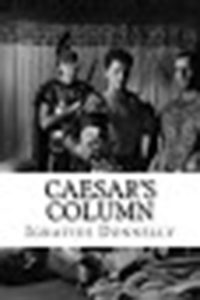In 19th century American popular fiction, writers either bring on the destruction of three-quarters of humanity, or things are so bad there has got to be a golden age in here somewhere. Either way, the future is rife with “pneumatic tubes.” Yesterday’s tomorrow is so jaded you can fly to the moon with a Hindu priest—and no one will believe you. One author’s dreamlike utopia achieves the “magnificent health of the women” by perfectly adapting their jobs “both as to kind and degree of labor” to their sex. A dystopian counterpart predicts that disgruntled civilians wield “the newest improved magazine rifles” and “air-sailors” will fly shiny dirigibles into the battle to bring down the world. Religion devolves into a shocking creed in which “the purposed end and aim of life is love.” In a tale seen as possibly the first American sci-fi novel, society exists off-world. Considering the forms in which the future actually is arriving, this loony lunar trip might be the likeliest after all.
Looking Backward: From 2000 to 1887
By Edward Bellamy (1888)
Wealth in the hands of a few. Americans near starvation. Women of all classes dominated or suppressed. All this changes when an entranced insomniac goes to sleep underground and wakes up in Bellamy’s utopia. His living tomb discovered, Julian West of 1887 comes to in 2000 in the household of friendly physician Dr. Leete. West’s benefactor starts drawing distinctions between the 19th and 20th centuries—ages of “corporate tyranny” versus “solidarity of the race and the brotherhood of man”—while taking his dazed patient’s pulse.
The 1800s of labor strikes and “excessive individualism,” the doctor explains, have given way to “public spirit,” a new-New World with no jails and no military. People work until age 45 and never “deprive themselves of any good thing,” Leete says. “The nation does not maim and slaughter its workmen by the thousands, as did the private capitalists and corporations of your day.” It’s come to this fortunate pass without revolution or even violence: “Public opinion had become fully ripe for it, and the whole mass of people was behind it.”
“It” refers to the national government’s assumption of responsibility for all commerce. “At last, strangely late in the world’s history, the obvious fact was perceived that no business is so essentially the public business as the industry and commerce on which the people’s livelihood depends, and that to entrust it to private persons to be managed for private profit is a folly similar in kind, though vastly greater in magnitude, to that of surrendering the functions of political government to kings and nobles to be conducted for their personal glorification.”
The nation is the sole employer, with citizens each serving 24 mandatory years in the “industrial army” that has replaced a capitalist system “which made the interests of every individual antagonistic to those of every other.” The new order stabilizes the economy and brings about a universally comfortable state of affairs.
The streets are covered, and “pneumatic transmitters” are the latest in communications. Householders can listen in their dwelling to music performed by professional musicians. West falls in love with Leete’s daughter Edith, who comes to sympathize with one of West’s earlier misfortunes: “I suppose it was these difficulties in the way of commanding really good music which made you endure so much playing and singing in your homes by people who had only the rudiments of the art.”
Women have careers, to an appropriate extent, in the “feminine army of industry” assigning seniority to wives and mothers, “as they alone fully represent their sex.” Romance has survived, with men and women meeting as “perfect equals, suitors to each other for nothing but love.” Women enjoy “magnificent health,” the doctor insists, and “are a very happy race nowadays, as compared with what they ever were before …And their power of giving happiness to men has been of course increased in proportion.”
Project Gutenberg offers a free e-book, or read in your browser.
***
A Voyage to the Moon—With Some Account of the Manners and Customs, Science and Philosophy of the People of Morosofia, and Other Lunarians
By George Tucker (1827)
Lenient captivity notwithstanding, an American castaway in Burma befriends a Brahmin priest from India cast out from his caste. The kindly hermit knows the secret to refining a rare metal with “as great a tendency to fly off from the earth, as a piece of gold or lead has to approach it” — and it is “in the same degree attracted towards the moon.” So that respected American businessman Joseph Atterley may educate his country regarding lunar society—India, still under British rule, having kept space flight a secret—he and the man from the subcontinent stage a sedate journey, dining on cold fowl and similar taste treats.
The moon’s origin as part of the Earth, in this very early specimen of American science fiction, explains how moongoers get back and forth across the heavens. In Atterley’s 1820s America, “the people are in the full enjoyment of all the arts of civilization, while they are unrestricted in their means of subsistence,” a golden age of sorts yet sillier than the works of Bellamy and Donnelly. Voyage is half social commentary and half speculation, positing a moon as blue and green as the home world—you can enjoy the fresh breeze off the mountains—that looks silver from Earth. Moon people are not the brightest bulbs in the universe. As the Indian protagonist puts it to his companion, “the inhabitants of the moon resembled those of the earth, in form, stature, features, and manners, and were evidently of the same species. … But the most curious part of this information was, that a large number of them were born without any intellectual vigour, and wandered about as so many automatons, under the care of the government, until they were illuminated with the mental ray from some earthly brains, by means of the mysterious influence which the moon is known to exercise on our planet. But in this case the inhabitant of the earth loses what the inhabitant of the moon gains.” Instead of flowers, moon women decorate their coiffures with insects, some of them alive, so the “perpetual buzzing and fl

uttering in their transparent cages, had a very animating effect.”
On his visit to the moon, Atterley collects specimens from nature while cataloging lunarian advances, such as a “digestor” able to extract soup from horns and a fuel efficiency-enhancing “smoke-retractor.” He lays down with total accuracy the future reality of sleeping on air mattresses. Moon folks may ride zebras, but their world isn’t totally absurd. On the dark side, astronomy is in a “high state of improvement.” No one on Earth believes Atterley. Appealing to mankind’s “sober and unprejudiced part,” he demands at the start that readers decide whether “what I have stated in the following pages, is not consonant with truth and nature, and whether they do not see there, faithfully reflected from the Moon, the errors of the learned on Earth, and ‘the follies of the wise?’”
Project Gutenberg offers a free ebook, or read in your browser.
***
Caesar’s Column: A Story of the Twentieth Century
By Ignatius Donnelly (1890)
In this view of the America to come, Gabriel Weltstein, a central African sheep farmer of Swiss descent, travels to New York City in 1988, hoping to outfox the middlemen of “the great Wool Ring” and sell his commodity directly to mills. That scheme hasn’t worked out when he’s whisked into the inner circle of a prodigiously armed global conspiracy to overthrow the status quo.
In the late 1800s, life in these United States as author Donnelly paints it is “a dark and wretched failure for the great mass of mankind.” He is writing as “Edmund Boisgilbert, MD,” but, given that before Donnelly was a novelist he was a populist member of Congress, there’s reason to suspect that Boisgilbert is channeling Donnelly. He definitely is writing a counterpoint to the futurism of Edward Bellamy, whose Looking Backward gave this column its name.
Clarity of worldview and a font of impassioned yet misplaced oratory—that’s Gabriel, who chronicles his adventures in a metropolis powered by the Earth’s magnetism and lit by auroras. The  narrative flows in letters to his brother in Uganda, including the story of Gabriel’s fateful run-in with a horse-drawn carriage, property of the local despot. Universally revered for his overall goodness, “noble, just and honorable” Gabriel in that moment meets a man who will become a close but flawed friend and a leader in the rebellion, meanwhile glimpsing his bride-to-be, the innocent Estella. The backdrop for this encounter is dissatisfaction, fueled by income disparity, that has the masses on the verge of revolt. “The most utterly useless, destructive and damnable crop a country can grow is—millionaires,” Gabriel insists. “If a community were to send to India and import a lot of man-eating tigers, and turn them loose on the streets, to prey on men, women and children, they would not inflict a tithe of the misery that is caused by a like number of millionaires.”
narrative flows in letters to his brother in Uganda, including the story of Gabriel’s fateful run-in with a horse-drawn carriage, property of the local despot. Universally revered for his overall goodness, “noble, just and honorable” Gabriel in that moment meets a man who will become a close but flawed friend and a leader in the rebellion, meanwhile glimpsing his bride-to-be, the innocent Estella. The backdrop for this encounter is dissatisfaction, fueled by income disparity, that has the masses on the verge of revolt. “The most utterly useless, destructive and damnable crop a country can grow is—millionaires,” Gabriel insists. “If a community were to send to India and import a lot of man-eating tigers, and turn them loose on the streets, to prey on men, women and children, they would not inflict a tithe of the misery that is caused by a like number of millionaires.”
Public schooling has endowed the working class with some knowledge, but proles have become “phantoms, or dead men,” immune to reason. Millions, “armed with the newest improved magazine rifles,” are just waiting for the order to come down by pneumatic tube.
In Donnelly’s imagined America women are at risk of being grabbed and sold into harems. With the insurgency about to erupt, a presumptuous prince imperils Estella’s maidenhood, but Gabriel whisks her from the palace and snaps up “the bill of sale” applying to his girl, who is “soft and lovable,” not “harsh and angular in character” like the “hard and soulless” women he encounters among the rich, whom he ranks as “splendid animals.” The hard women include followers of a secularized church whose creed shocks Gabriel. “The purposed end and aim of life is Love,” the sect declares. “What a powerful impulse is this Love? It is nature-wide. The rushing together of the chemical elements; the attraction of suns and planets—all are Love.”
When the war for the world does begin, Donnelly describes his idea of 1980s-era weaponry: shiny, fish-shaped airships, bowie knives, explosives mixed with bullets, and nearly invincible “death bombs. Yes, there is a column, but not what you might be expecting.
Project Gutenberg offers the free e-book, or read in your browser.
“Looking Backward” is Amanda Miller’s online column on American History. Miller is a 20-year veteran journalist with a background in history and English.





